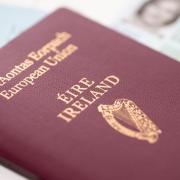Many of our clients have been contacting the office concerned and confused regarding their eligibility for naturalization or the position regarding their pending application for naturalization.
This is as a result of the recent judgement of the High Court, Jones v Minister for Justice record number 2018/921 JR.
The requirements for an applicant to be eligible to apply for naturalization are laid out in statute, the primary act being the Irish Nationality and Citizenship Act 1956.
A fundamental requirement to be eligible to apply for naturalization is that you hold the required “reckonable residence”.
For a standard application the required period of reckonable residence is five years, this is reduced to a period of three years for the spouses and civil partners of Irish Citizens and for refugees.
This period of five years can be made up as a period of four years within the last eight, with one year “continuous residence “ in the year prior to application.
This is 2 years in the last four and one year continuous for those eligible for the reduction to 3 years reckonable residence if applying based on being the spouse of an Irish national or a holder of refugee status.
Reckonable residence is also defined in law as residence which is not in breach of immigration law (unlawful residence ), not for the purpose of study and not for the purpose of seeking international protection.
Therefore a person who is legally resident and does not fall into one of the categories above is resident as per the definition of reckonable residence.
A person does not lose their residence or right to reside in Ireland if they leave for holidays, work purposes and for up to six months per year for holders of EU residence cards. They therefore remain resident in Ireland for immigration purposes. The Court has found that the requirement for continuous residence does not equate with residence for immigration purposes, but with physical residence.
There has been a question on the application form for naturalization for a number of years, namely question 5.6, which asks an applicant if they have been absent from the state for more than six weeks in any year in the last five year period.
An applicant is asked to confirm if they have or have not been so absent and if they have, to explain these absences on a separate sheet.
Many clients have sought our advices on this question including clarity as to whether the calculation should be made based on a calendar year or the year immediately prior. We have been asked to clarify if a person leaves and comes back in one day does this count as an absence?
This question also makes little sense to an applicant applying based on marriage to an Irish citizen where their required three years reckonable residence has been in Northern Ireland. The citizenship acts allow spouses of Irish nationals to rely on residence in Northern Ireland to count as their reckonable residence for the purposes of naturalisation. This does not apply to standard applicants.
Therefore the spouse/civil partner of an Irish national who has resided solely in Northern Ireland and has never lived in Ireland is eligible for naturalization in law, but has been totally physically absent from the Republic of Ireland.
A number of years ago applicants began to be informed that their application for naturisation had been deemed ineligible on the basis of question 5.6 and their absences from the state. This became known as the “six week rule”.
There is no note or information on the application form or the attached guidance note to state that absences from the state over 6 weeks per annum will be discounted from an applicants reckonable residence or that same will count as a break of continuous residence if applicable to the year before application.
An applicant for naturalization is also required to fill in an INIS residence calculator and this calculator is provided online. Applicants are never informed to remove from their calculation any absences or that any absences will be subtracted.
The Minister thereafter appeared to operate a flexible policy where absences from some reasons such as work or employment would not be subtracted but others such as for travel, family reasons would be subtracted. The approach appeared to vary from case to case.
By way of comparison, in the United Kingdom the allowable absences are laid out on law , Section 6(1) of the British Nationality Act 1981 allows for 450 days absence in the five year period and 90 days in the year previous. There is also room for discretion on the part of the decision maker. The Home Office also provide detailed guidance for decision makers regarding the meaning of absence, physical residence and technical absence.
It has been difficult to advise clients as to their eligibility for naturalization due to the lack of clarity regarding absences and their effect on the application.
The recent judgement in Jones has changed matters further.
The Court finds in Jones that the law requires continuous residence in the year prior to application and that continuous residence is defined as per the generally accepted understanding and dictionary definition of continuous. Therefore even one days absence from Ireland in the year prior to application will break the continuous residence requirement and leave a person ineligible to apply for naturalization as an Irish citizen.
The court further found that the Minister has no legal basis for the operation of the six week rule, throwing into question the legal validity of certificates of naturalization already granted to persons who did not meet this strict interpretation of continuous residence.
It is also of note that permission letters held by non EEA nationals often state that a condition of permission is that the holder is continuously reside in the state. The letters go on to state that continuous residence is defined as residence in the State, allowing for absences for travel, holiday and so on. Therefore a person remains continuously resident for the purposes of their immigration permission when traveling for work and holiday purposes, but not for the purposes of naturalization.
Furthermore, persons resident in Ireland under Directive 2004/38/EC and the European Communities (Free Movement of Persons) Regulations 2015 rights of residence are not affected by temporary absences of up to six months per year.
It it is yet to be seen how the Minister will approach the judgement of the Court in Jones with respect to pending applications for naturalization.
It will also be of note to see if a statutory amendment to the legislation governing naturalization and reckonable residence requirements is now made.
The position is now very difficult for those who have applied for naturalization or those intending to apply in the near future as their ability to travel or the impact this will have on their application for naturalisation is highly uncertain.
We will be keeping our clients updated as to any further developments in this regard and will post any further updates on this blog.
The full judgement can be found here.



